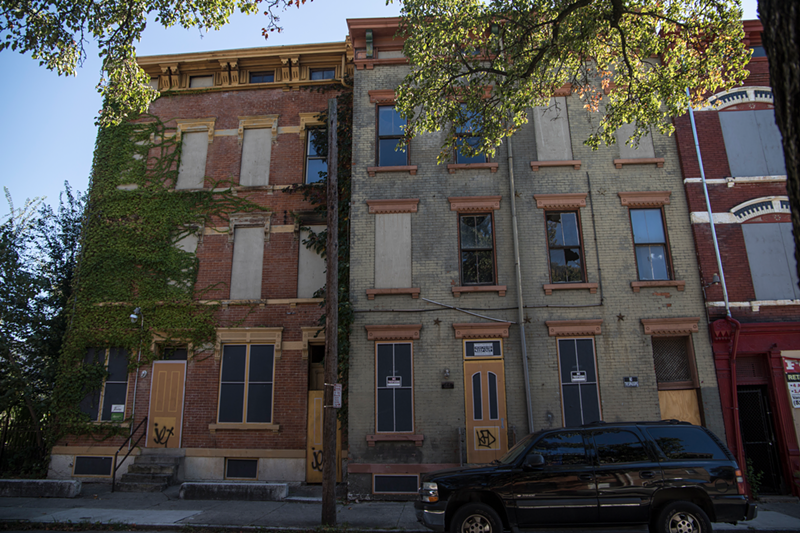
A project that would renovate 10 vacant buildings in Lower Price Hill and construct a new building to create 47 units of affordable housing and mixed-use space won $11 million in state funding. But its future is in doubt because the city has declined the project's application for a $1 million loan.
The city cited a few reasons for the lack of funding, but community leaders and some Cincinnati City Council members are asking questions about how the decision was made and looking for alternate ways to loan the development the funds it needs.
Without them, the project could lose the $11 million it already has. That funding has been more than five years in the making, Community Matters Executive Director Mary Delaney says. Community Matters is partnering with Over-the-Rhine Community Housing (OTRCH) on the project, called Lower Price Hill Thrives.
Lower Price Hill Thrives won $8 million worth of Low Income Housing Tax Credits administered by the Ohio Housing Finance Agency, as well as state Historic Preservation Tax Credits. The former can be used to attract investors to finance construction on the project. In return, the property owner must promise to keep the residential units affordable and reserved for low and moderate-income households. OHFA also approved the project for federal loans to help finance the building.
Units will range from efficiencies renting at $343 a month to three bedrooms renting between $460 and $1,094 a month — affordable to those making between 30% and 60% of the area median income.
Lower Price Hill suffers from an almost 40% vacancy rate. The community's median income is roughly $14,800 a year. It's a diverse neighborhood — these days about 50% white, 40% black and 10% people of Hispanic origin.
Delaney says many of the families are deeply invested in Lower Price Hill, sometimes for multiple generations, and most want to stay there. But the condition of the neighborhood's housing stock and its rate is making that harder, prompting some families to have to move. This project would address that need, supporters say.
"Since I've lived in the neighborhood, I've wanted development like this to happen," resident Ebony Taylor says. "Lower Price Hill needs this. If we can't find the money, I don't know what the neighborhood is going to do. It's already in shambles now."
But the city says Community Matters has a number of outstanding code violations, that the project has opposition from some in the city and that another project in the neighborhood got funding.
The city funded 10 of 12 projects that applied through a competitive process, awarding $6.9 million to those applicants, detailed here.
Council member P.G. Sittenfeld called a public hearing today to explore other potential avenues for funding, including the city's affordable housing trust fund.
"How and why this was denied remains to me bizarre," Sittenfeld said.
The plan has support from the Lower Price Hill Community Council, area businesses like Nehemiah Construction, The Cincinnati Reds Community Fund, Habitat for Humanity and other groups.
Habitat for Humanity did receive funds through the city's competitive Notice of Funding Availability application process — the process that declined funding for Lower Price Hill Thrives.
"We're committed to the neighborhood for the long haul," a representative from Habitat for Humanity Cincinnati told council today. "Both are desperately needed and supported by the community. Lower Price Hill needs investment in affordable rental housing and affordable home ownership opportunities."
City of Cincinnati Interim City Manager Paula Boggs Muething today released a memo discussing the city's decision.
"Though there were many positive factors for this project, additional applicant background information, some level of community opposition, and policy implications all informed the final decision," that memo says, citing weeds and other ongoing code complaints. "For one, properties controlled by Community Matters have a history of code violations, and the organization has failed to be responsive to the Department of Buildings and Inspections on addressing these concerns."
But Delaney says Community Matters has been responsive to the violations, which preexist the nonprofit's ownership of the troubled buildings.
"We intentionally purchase the most distressed properties in the neighborhood," Delaney says. "I definitely communicate very often with building and inspections. The two violations that keep getting thrown in our face are ones that we can only solve with this project. We're stuck in this weird situation where the city is saying "renovate these buildings,' but we need this funding to renovate them."
Some council members also are skeptical and wonder if a well-connected developer has used his influence to scuttle the project.
"I don't really understand the memo," Cincinnati City Council member Chris Seelbach said. "This was denied due to weeds? The one person I know who opposes this has pretty powerful political connections to another person who works in office. It seems really fishy to me, knowing that the public is begging for this... that this project is derailed. It really seems quite obvious that it did."
Seelbach was referring to developer Bill Burwinkel, who is a longtime ally of Mayor John Cranley. Burwinkel owns the historic West End Bank Building on West Eighth Street in Lower Price Hill. He's also been a big player in the ongoing redevelopment of East Price Hill.
The head of the Reds Community Fund in June sent Sittenfeld an email expressing concerns that "a community competitor" opposed to Lower Price Hill Thrives continued to challenge the project, but did not name who that competitor was.
Cranley, meanwhile, has indicated he is in opposition to the project, saying he believes it will concentrate poverty in Lower Price Hill. Multiple sources say Cranley this week declined to sign paperwork certifying that the project is eligible for its historic preservation tax credits.
The city's Department of City and Economic Development (DCED) assesses applications for the city's NOFA process, but the city manager has the final say over allocations. CityBeat has requested scoring criteria and scorecards from DCED, but has not received that public records request at time of publication.
"There is nothing untoward that has happened here," interim city manager Muething said today.
Council members say they're committed to finding alternate funding mechanisms for the low-interest loan, including a small portion from the neighborhood's Tax Increment Finance district. That fund only holds about $400,000 currently, however.
OTRCH and Community Matters say they have until the end of the year to wrap up funding for the project before they risk losing the funding they've already accrued.
"There's a lot of surprise about how something that was a surefire, homerun yes became a no," Sittenfeld said. "You have commitment from this council that we'll find the funds. Hopefully this is a rare ocurrance."





